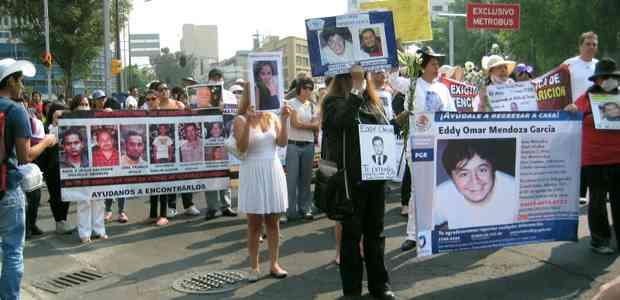Mexican families left disappointed after government starts new investigations unit
Relatives of Mexico’s disappeared leave the Mother’s Monument in Mexico City earlier this year. (Photo by Shannon Young.)
Mexican officials this week announced the formation of a special investigative unit to search for thousands of missing persons.
The announcement was supposed to kick off the work of that new unit but instead it left the families of the missing deeply disappointed.
“If they want people who will do the job and investigate, they should contract us because we will find them, they won’t. They’re just putting on a political show,” said Beatriz Mejía, whose daughter went missing last November and was among a group of relatives who attended the event in Mexico City.
Mejía and the other relatives had come to hear concrete operational details about the new investigative unit. The explanation they got from Attorney General Jesús Murillo Karam fell short of those expectations.
Karam said there are still some “legal things” that need to be figured out — including the unit’s location. But he promised that “the agreement and the will are already there.”
The attorney general and other officials left the ceremony without saying what basic resources the new unit could count on — like an operating budget or even office space. One concrete figure they did offer was the number of investigators in the unit: 12.
That number strikes many as grossly inadequate.
According to official statistics released in February, more than 26,000 people went missing in Mexico in the six year term of former President Felipe Calderón, a number comparable to the crisis of disappeared persons during Argentina’s military regime from 1976 to 1983.
Relatives of the disappeared say the Mexican government has failed to deal with the crisis head-on, forcing many families to conduct their own private investigations.
Yolanda Morán spoke at a Mother’s Day march earlier this month. She says her son was abducted by soldiers and never heard from again. And she says the investigative burden is squarely on the families.
“We’ve become investigators,” she said. “We’re the ones who’ve given the most information to the detectives; enough for them to have done their jobs already. The last administration wasted time. We want the new security strategies to include real case work and searches because it’s not fair that we have to do this with our own resources.”
Private investigations have their limits, especially when it comes to arresting suspects, exhuming possible mass grave sites and conducting forensics work. A common complaint among families who have carried out investigations is that authorities have failed to act in a timely manner on information they’ve provided, which could help solve or advance their cases.
At Monday’s ceremony, Karam said one aim of the new special investigative unit was to destroy the “bureaucratic labyrinth” families encounter. He also said that oversight by victims groups would play a key role in this regard.
But families of the missing are tired of what they say are empty promises.
Even the new unit unveiled on Monday is an example of that.
Its creation was first announced three months ago by Mexico’s Interior Ministry.
But even now, almost everything about how the unit is supposed work remains unclear.
Atanacio Rodríguez, who participated in a recent hunger strike by relatives, says people are growing more and more frustrated in their dealings with the authorities.
“They’re always giving us the runaround,” said Rodríguez. “We don’t want them to keep playing with our pain. Even though they play with our hopes, with our personal finances, and they send us like ping pong balls around to different offices while nobody solves anything. No one even gives us the hope of being able to find out what happened to our sons and daughters.”
With this week’s announcement, the government of President Enrique Peña Nieto is promising once again to change that.
Just how long the special investigative unit takes to begin operating, and the way the unit handles cases, will reveal how serious President Peña Nieto is about keeping that promise.
